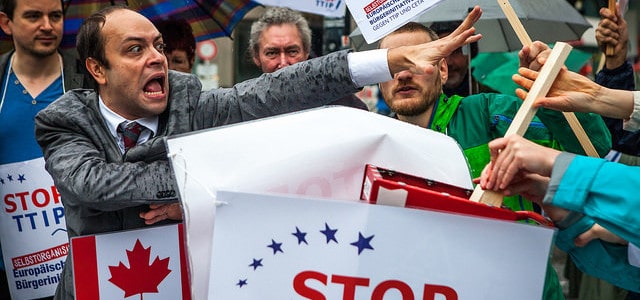Published
The Politics of TTIP – What are the Key Controversies, How to Address Them?
Subjects: EU Trade Agreements European Union North-America Services

The recent conference organised by ECIPE on the Trans-Atlantic Trade and Investment Partnership (TTIP) that the EU and the US are currently negotiating led to a very stimulating debate. We had four panellists bringing different points of view. Matthias Bauer and Marietje Schaake, a Senior Economist at ECIPE and a senior MEP, respectively, presented the “European” perspective on TTIP while Chris Israel and Elena Bryan, a partner at ACG Analytics and the United States Trade Representative in Europe, brought to the floor the “American” viewpoint on TTIP.
Matthias Bauer presented the results of a forthcoming study on European’s opinions on TTIP. He analysed online media coverage on TTIP and how online media report the views of anti-TTIP groups, the European Commission and the business associations, and coalition groups in the European Parliament. Bauer reported some interesting results. First of all, the share of online media coverage on the agreement by anti-TTIP groups is larger than 60% while the Commission and business associations have less than 40% representation in online media. Second, the statements by EU Commission and business association are more present in online newspapers while anti-TTIP groups are very active on Facebook and twitter. Third, online media is heavily focused on selected aspects of the negotiations. Investment protection, or ISDS, is certainly the biggest one. Fourth, negative and positive sentiments have developed over time since TTIP negotiations started. Negative sentiments have accelerated since the first round, peaking during the 5thand the 7th rounds of the negotiations. Positive sentiments, on the other hand, have accelerated since the 6th round.
Moreover, European Parliamentarians are no cheerleaders for TTIP. All party groups have expressed more negative sentiments than positive sentiments in online media. Anti-TTIP groups are clearly more represented in online media than the European Commission or business associations. And in the EU member states, there are almost no political parties which are making positive statement about TTIP.
Marietje Schaake believes that we should not rely on quantitative estimates about online opinions alone. She finds TTIP negotiations complex and agued it is important for MEPs to get into the facts rather than broadcast populist opinions. Nor thus she thinks it is the job of MEPs to be cheerleaders or follow the line of the Commission; the role of the MEPs is rather to examine what the executive is doing. Furthermore, she argued that there is a disconnection between the hot-button issues in the debate and those that are the key to get a substantial TTIP agreement. She argued that other issues such as public procurement, the digital economy, patent, cultural services, agricultural products, and consumer regulations are essential for a successful TTIP.
Chris Israel presented a poll done by the Tarrance Group about U.S. opinions on TTIP and support for improved trade relations with Europe. The survey, conducted in 50 states, showed strong support among Americans for improving the commercial relations with the European Union. While there is little awareness among the public that TTIP is being negotiated, more than 50% of U.S. citizens strongly support the idea of promoting economic growth and jobs creation by trade and investment agreements. Furthermore, 56% agreed that the U.S. has benefited from previous free trade agreements. They also highly support (71%) a more unified trade relationship with the EU.
The full Tarrance Group poll also surveyed what issues that Americans would have problem with, should they become subjects in a trade agreement. The issue where the poll showed the sensitivities to be strongest is patents and trademarks. Chris Israel argued it is a reflection of the strong dependence on IP for the American economy and that Americans largely feel that erosions of IP such as patents and trademarks will have negative consequences for U.S. companies and jobs.
Elena Bryan argued that while there has been increasing political controversy around TTIP, the United States and the European Union are powerful traders that have enjoyed a long and positive economic relation. While the gains from TTIP are positive, the negotiations are complex since the two parties have different economies, different legal structures, different regulations, and often do things in different manners even if they come to the same end. Nevertheless, the parties are working together to develop a balanced agreement in order to get political support from both sides.